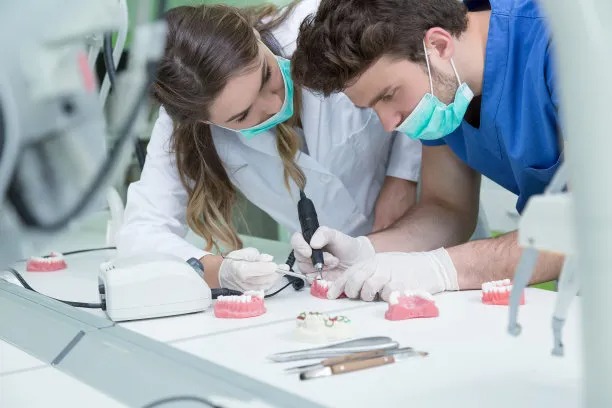Summary: Dental implants have transformed the field of dentistry, offering individuals the chance to regain not only their oral health but also their confidence. This guide delves into the revolutionary impact of dental implants, exploring their benefits, the procedure involved, post-operative care, and the psychological advantages they bring. By understanding these facets, one can make an informed decision about enhancing their smile, leading to improved overall well-being and self-esteem.
1. Benefits of Dental Implants for Oral Health

Dental implants play a crucial role in improving oral health by providing a strong foundation for artificial teeth. Unlike dentures, implants are anchored directly into the jawbone, which helps prevent bone loss. When a tooth is lost, the underlying bone can deteriorate over time, leading to further dental complications. Implants stimulate the bone, maintaining its density and structural integrity.
Furthermore, dental implants can improve bite strength and alignment. This allows individuals to chew food more effectively, thereby enhancing their overall nutritional intake. With implants, there’s no fear of slippage or discomfort commonly associated with removable dentures, allowing for a much more natural eating experience.
Additionally, dental implants can facilitate better oral hygiene. Unlike bridges that require alteration of neighboring teeth, implants stand alone, making it easier to maintain proper dental care. Patients can brush and floss around implants as they would with natural teeth, significantly contributing to long-term oral health.
2. The Dental Implant Procedure Explained
The process of getting dental implants involves several stages, starting with a comprehensive dental examination. This may include X-rays and 3D imaging to evaluate the jawbones condition and plan the implant placement accurately. A personalized treatment plan is essential for success, ensuring all individual needs are met.
The next step in the procedure is the surgical placement of the implant. Under local anesthesia, the dentist will insert the titanium post into the jawbone, serving as the root of the new tooth. After this surgery, there is typically a healing period of several months, during which osseointegration occurs—this is the process by which the jawbone fuses with the implant, creating a durable foundation.
Once the implant has integrated with the bone, an abutment is attached, followed by the placement of a custom-made dental crown that mimics the appearance of natural teeth. This multi-phase approach ensures that the final result not only functions well but also looks aesthetically pleasing, blending seamlessly with the existing smile.
3. Post-Operative Care for Dental Implants
Post-operative care is vital for dental implant success and includes following specific guidelines provided by the dentist. Initially, patients may experience swelling and discomfort, which can be managed with prescribed medications and cold compresses. It is essential to avoid certain activities, like vigorous exercise or consuming hard foods, to aid in healing.
Oral hygiene remains paramount following the placement of dental implants. Maintaining a rigorous dental care routine is crucial; this includes brushing twice a day and regular flossing. Special attention should be given to the implant area, ensuring no plaque accumulates, which could lead to complications such as infections.
Regular dental check-ups and cleanings are necessary to monitor the condition of the implants and surrounding gum tissue. This proactive approach will not only enhance the longevity of the implants but also help in addressing any issues promptly if they arise.
4. Psychological Benefits of Improved Smiles
Beyond physical benefits, dental implants can significantly boost psychological well-being. Many individuals report increased confidence and self-esteem after receiving implants. A full, healthy smile often translates into more positive social interactions and a willingness to engage with others, improving quality of life considerably.
Additionally, the psychological impact of missing teeth can lead to feelings of embarrassment and social withdrawal. Dental implants provide a permanent solution, alleviating these concerns and allowing individuals to freely express themselves without self-consciousness.
Finally, the improvement in oral health that dental implants provide can lead to a more positive self-image. When individuals feel good about their smiles, they are more likely to smile more frequently, which in turn can foster happiness and reduce stress. The transformation that happens not only enhances smiles but also uplifts spirits, creating a ripple effect in various aspects of life.
Summary: The implementation of dental implants represents a transformative advancement in dental procedures, offering numerous benefits from enhanced oral health to psychological upliftment. This guide has elaborated on the multifaceted advantages of implants, emphasizing their importance in modern dentistry. Understanding the entire process—from benefits to post-operative care—enables individuals to make informed decisions about their oral health.
This article is compiled by Vickong Dental and the content is for reference only.
Vickong Dental
Vickong Dental is a large medical group established in Hong Kong in 2008 by professors from well-known medical universities in Guangdong and Hong Kong, as well as medical doctors from key national '985' universities (including Master's supervisors and senior professors). The chain of branches brings together expert dentists with PhDs and Master's degrees from Hong Kong and Mainland China, committed to providing high-quality dental treatment.
"Vickong Dental Practices the University Motto of 'Healing and Serving Society,' with a Stable Operation for Sixteen Years. It Has Been honored with Hong Kong Enterprise Leaders's Choice,' and is a Global Trusted Implant Center for the Nobel Implant System. Recommended by Hong Kong Metro Broadcast and Guangdong Television, it Serves Customers from Over Thirty Countries and Regions, Gaining the Trust and Favor of Citizens from the Guangdong-Hong Kong-Macau Greater Bay Area and Surrounding Cities.

Thousands of customers' unanimous praise
The most recognized and highly recommended dental service by customers in the Guangdong-Hong Kong-Macau Greater Bay Area
We Ensure You Receive Detailed Care and Attention Here
Hong Kong standards, Shenzhen prices, Your Trusted English-speaking dentists

Vickong Dental Medical-Grade Instrument Disinfection Process
Vickong Dental Medical-Grade Instrument Disinfection Process

Vickong Dental Chain: A Warm and Comfortable Environment for Treatment






Appointment Hours

Q&A
Why choose Vickong Dental?
Vickong Dental practices the university motto 「Medicine to Benefit Society」, with each branch bringing together highly qualified dentists with doctoral and master’s degrees from Hong Kong and the Mainland, and has maintained seventeen years of steady operation。Recipient of 「2024 Hong Kong Enterprise Leaders Brand」, 「2025 Hong Kong Enterprise Leaders Brand」, a Nobel Biocare Global Trusted Implant Center, and a brand recommended by Metro Radio Hong Kong and Guangdong TV。
To date, we have served customers from more than thirty countries and regions,earning exceptionally high word-of-mouth recognition and trusted recommendations from residents across the Guangdong-Hong Kong-Macao Greater Bay Area and surrounding cities
We have eight major branches in Zhuhai、Shenzhen,and a consultation and service assurance center in Hong Kong,so you can book a free consultation at any time for any questions,which is very reassuring.
If I do not accept the quotation after the CT scan, will I be charged??
No! As long as the actual treatment has not started, you will not be charged any fees.
Will there be any additional charges during the treatment process?
No, there won’t be any additional charges. Before treatment begins, we will clearly explain the treatment plan and its corresponding fees. Only after the patient agrees and signs the consent form will we proceed with the dental service.
Can I pay in Hong Kong dollars?
Yes. Vickong Dental accepts payment in Hong Kong dollars. The amount will be converted based on the exchange rate of the day, and the applicable rate will be clearly communicated to you in advance.
Can I reschedule my appointment at any time?
Yes. Please contact us via **WeChat** or **WhatsApp** as early as possible, providing your original appointment time and details, along with your preferred new date and time slot for rescheduling.













